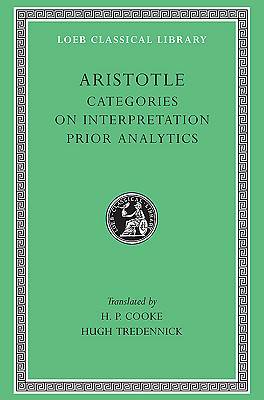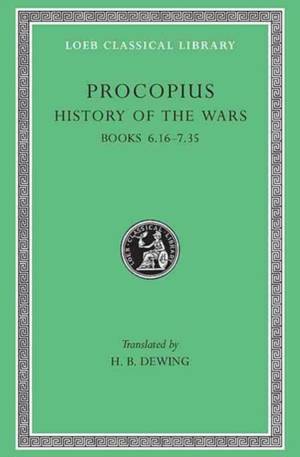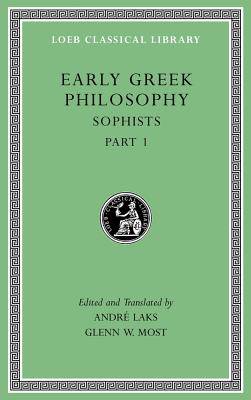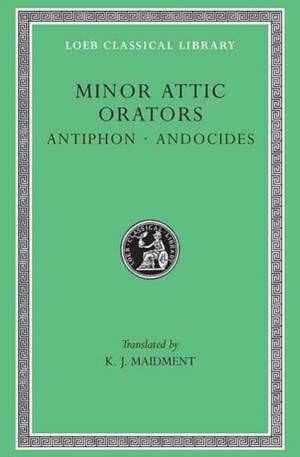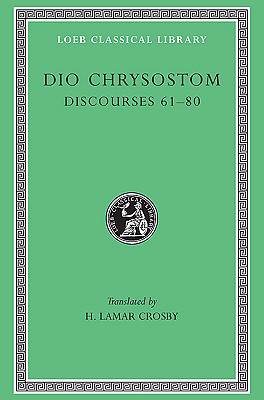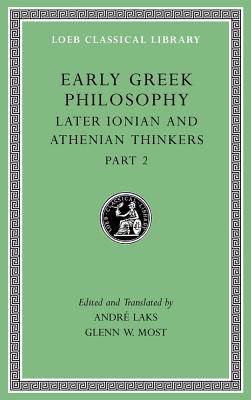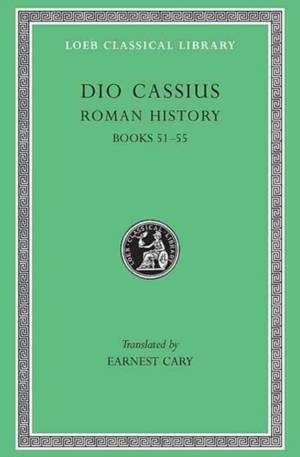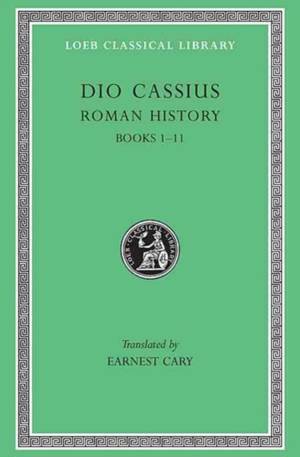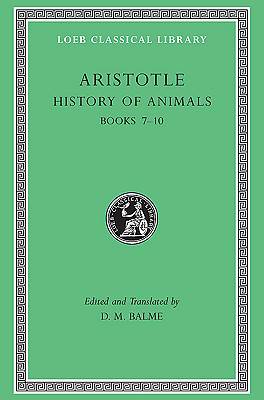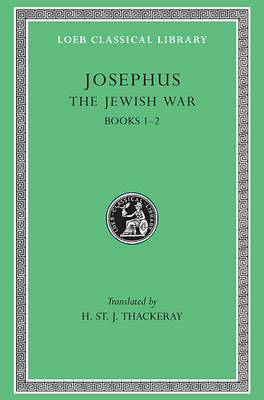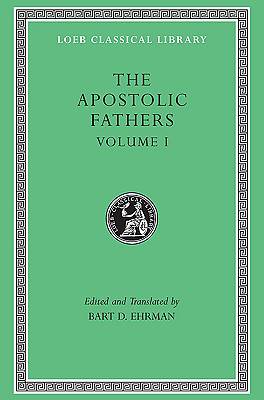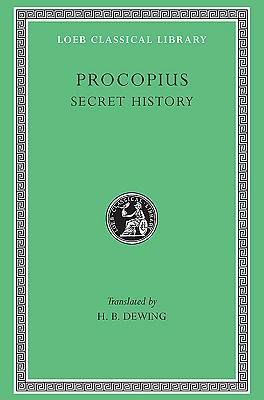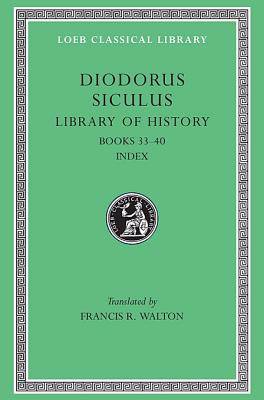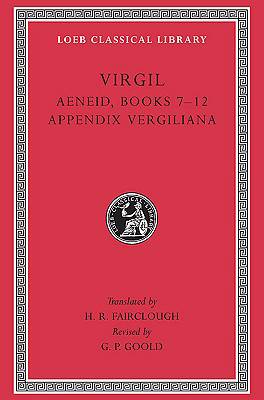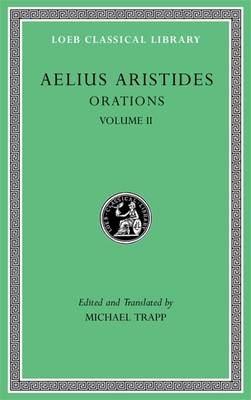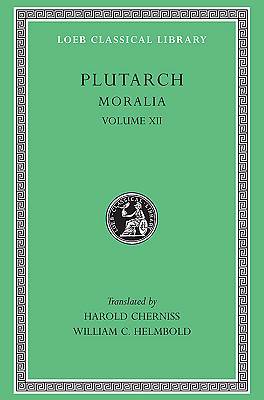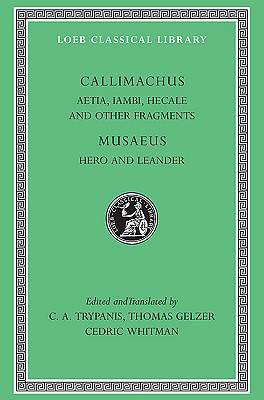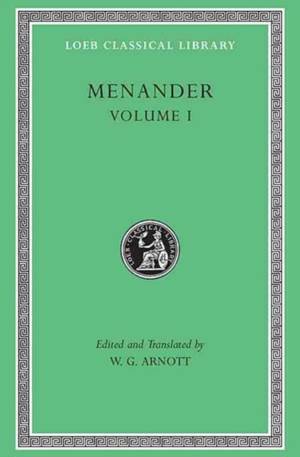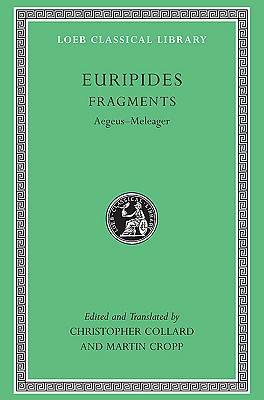
- Retrait gratuit dans votre magasin Club
- 7.000.000 titres dans notre catalogue
- Payer en toute sécurité
- Toujours un magasin près de chez vous
- Retrait gratuit dans votre magasin Club
- 7.000.0000 titres dans notre catalogue
- Payer en toute sécurité
- Toujours un magasin près de chez vous
Résultats pour "Loeb Classical Library"
-
Saturnalia, Volume II
Macrobius
- Livre relié | Anglais | Loeb Classical Library
- Saturnalia has been prized since the Renaissance as a treasure trove of otherwise unattested lore. Savoir plus
42,95 €Livraison 1 à 2 semaines42,95 €Livraison 1 à 2 semaines -
Categories. On Interpretation. Prior Analytics
Aristotle
- Livre relié | Anglais | Loeb Classical Library
- Nearly all the works Aristotle (384–322 BC) prepared for publication are lost; the priceless ones extant are lecture-materials, notes, and memoranda (... Savoir plus
42,95 €Livraison 1 à 2 semaines42,95 €Livraison 1 à 2 semaines -
History of the Wars, Volume IV
Procopius
- Livre relié | Anglais | Loeb Classical Library
- History of the Wars by Procopius (late fifth century to after AD 558) consists largely of sixth-century military history, with much information about ... Savoir plus
42,95 €Livraison 1 à 2 semaines42,95 €Livraison 1 à 2 semaines -
Early Greek Philosophy, Volume VIII
- Livre relié | Anglais | Loeb Classical Library | n° 531
- A major new edition of the so-called Presocratics. The fragments and testimonia of the early Greek philosophers (often labeled the 'Presocratics') hav... Savoir plus
42,95 €Livraison 1 à 2 semaines42,95 €Livraison 1 à 2 semaines -
Minor Attic Orators, Volume I: Antiphon. Andocides
Antiphon, Andocides
- Livre relié | Anglais | Loeb Classical Library
- Antiphon disliked democracy and was an ardent oligarch. Of his fifteen extant works three concern real murder cases. The others are academic exercises... Savoir plus
42,95 €Livraison 1 à 2 semaines42,95 €Livraison 1 à 2 semaines -
Discourses 61–80
Dio Chrysostom
- Livre relié | Anglais | Loeb Classical Library
- Dio Chrysostom (AD ca. 40–ca. 120) was a rhetorician hostile to philosophers, whose Discourses reflect political or moral concerns. What survives of h... Savoir plus
42,95 €Livraison 1 à 2 semaines42,95 €Livraison 1 à 2 semaines -
Roman History, Volume VI
Appian
- Livre relié | Anglais | Loeb Classical Library | n° 544
- Rome's internal conflicts, from the Gracchi to the Empire. Appian (Appianus) is among our principal sources for the history of the Roman Republic, par... Savoir plus
42,95 €Livraison 1 à 2 semaines42,95 €Livraison 1 à 2 semaines -
Roman History, Volume V
Appian
- Livre relié | Anglais | Loeb Classical Library | n° 543
- Rome's internal conflicts, from the Gracchi to the Empire. Appian (Appianus) is among our principal sources for the history of the Roman Republic, par... Savoir plus
42,95 €Livraison 1 à 2 semaines42,95 €Livraison 1 à 2 semaines -
Early Greek Philosophy, Volume VII
- Livre relié | Anglais | Loeb Classical Library | n° 530
- A major new edition of the so-called Presocratics. The fragments and testimonia of the early Greek philosophers (often labeled the 'Presocratics') hav... Savoir plus
42,95 €Livraison 1 à 2 semaines42,95 €Livraison 1 à 2 semaines -
Roman History, Volume VI
Dio Cassius
- Livre relié | Anglais | Loeb Classical Library
- Dio Cassius (Cassius Dio), ca. AD 150–235, was born in Bithynia. Dio’s work is a vital source for the last years of the Roman republic and the first f... Savoir plus
42,95 €Livraison 1 à 2 semaines42,95 €Livraison 1 à 2 semaines -
Roman History, Volume I
Dio Cassius
- Livre relié | Anglais | Loeb Classical Library
- Dio Cassius (Cassius Dio), ca. AD 150–235, was born in Bithynia. Dio’s work is a vital source for the last years of the Roman republic and the first f... Savoir plus
42,95 €Livraison 1 à 2 semaines42,95 €Livraison 1 à 2 semaines -
History of Animals, Volume III
Aristotle
- Livre relié | Anglais | Loeb Classical Library
- Nearly all the works Aristotle (384–322 BC) prepared for publication are lost; the priceless ones extant are lecture-materials, notes, and memoranda (... Savoir plus
42,95 €Livraison 1 à 2 semaines42,95 €Livraison 1 à 2 semaines -
The Jewish War, Volume I
Josephus
- Livre relié | Anglais | Loeb Classical Library
- The major works by Josephus are History of the Jewish War, from 170 BC to his own time, and Jewish Antiquities, from creation to AD 66. Also by him ar... Savoir plus
42,95 €Livraison 1 à 2 semaines42,95 €Livraison 1 à 2 semaines -
Autobiography and Selected Letters, Volume II
Libanius
- Livre relié | Anglais | Loeb Classical Library
- Libanius, one of the last great publicists and teachers of Greek paganism, has much to tell us about the tumultuous world of the fourth century AD. Hi... Savoir plus
42,95 €Livraison 1 à 2 semaines42,95 €Livraison 1 à 2 semaines -
The Apostolic Fathers, Volume I
Ehrman Bart
- Livre relié | Anglais | Loeb Classical Library
- The writings of the Apostolic Fathers (first and second centuries AD) give a rich and diverse picture of Christian life and thought in the period imme... Savoir plus
42,95 €Livraison 1 à 2 semaines42,95 €Livraison 1 à 2 semaines -
Secret History
Procopius
- Livre relié | Anglais | Loeb Classical Library
- In Secret History Procopius (late fifth century to after AD 558) attacks the sixth-century emperor Justinian and empress Theodora and alleges their ru... Savoir plus
42,95 €Livraison 1 à 2 semaines42,95 €Livraison 1 à 2 semaines -
Library of History, Volume XII
Diodorus Siculus
- Livre relié | Anglais | Loeb Classical Library
- Library of History is in three parts: mythical history to the Trojan War; history to Alexander’s death (323 BC); history to 54 BC. Books 1–5 and 11–20... Savoir plus
42,95 €Livraison 1 à 2 semaines42,95 €Livraison 1 à 2 semaines -
Method of Medicine, Volume II
Galen
- Livre relié | Anglais | Loeb Classical Library
- In Method of Medicine, Galen provides a comprehensive and influential account of the principles of treating injury and disease. Enlivening the detaile... Savoir plus
42,95 €Livraison 1 à 2 semaines42,95 €Livraison 1 à 2 semaines -
Aeneid, Books 7–12. Appendix Vergiliana
Virgil
- Livre relié | Anglais | Loeb Classical Library
- Virgil (70–19 BC) was a poet of immense virtuosity and influence. His Eclogues deal with bucolic life and love, his Georgics with tillage, trees, catt... Savoir plus
42,95 €Livraison 1 à 2 semaines42,95 €Livraison 1 à 2 semaines -
Orations, Volume II
Publius Aelius Aristides Theodorus
- Livre relié | Anglais | Loeb Classical Library | n° 545
- Meticulous eloquence. Publius Aelius Aristides Theodorus was among the most celebrated, versatile, and influential authors of the Second Sophistic era... Savoir plus
35,95 €Livraison 1 à 2 semaines35,95 €Livraison 1 à 2 semaines -
Moralia, XII
Plutarch
- Livre relié | Anglais | Loeb Classical Library
- Plutarch (ca. AD 45–120) wrote on many subjects. His extant works other than the Parallel Lives are varied, about sixty in number, and known as the Mo... Savoir plus
42,95 €Livraison 1 à 2 semaines42,95 €Livraison 1 à 2 semaines -
Aetia, Iambi, Hecale and Other Fragments. Hero and Leander
Callimachus, Musaeus
- Livre relié | Anglais | Loeb Classical Library
- Fragments by Callimachus (third century BCE) include those from the Aetia, Greek aetiological stories; a book of Iambi; and the epic poem Hecale. Hero... Savoir plus
32,45 €Livraison 1 à 2 semaines32,45 €Livraison 1 à 2 semaines -
Menander, Volume I
Menander
- Livre relié | Anglais | Loeb Classical Library
- Menander, the dominant figure in New Comedy, wrote over 100 plays, of which one complete play, substantial portions of six others, and smaller but int... Savoir plus
42,95 €Livraison 1 à 2 semaines42,95 €Livraison 1 à 2 semaines -
Fragments
Euripides
- Livre relié | Anglais | Loeb Classical Library
- Euripides (ca. 485–406 BC) has been prized in every age for his emotional and intellectual drama. Eighteen of his ninety or so plays survive complete,... Savoir plus
42,95 €Livraison 1 à 2 semaines42,95 €Livraison 1 à 2 semaines






